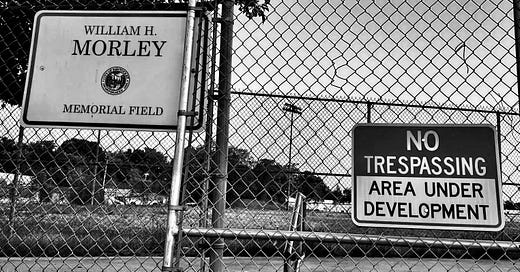Pawtucket residents uncover decades of potential land-use violations by city
Through their research, residents believe that Morley Field is not the only recreational or greenspace in Pawtucket that is facing or has faced possibly illegal conversion...
Pawtucket residents opposed to the sale and destruction of Morley Field have discovered through their research that the City has long ignored the law when it comes to the conversion of city-owned recreational and greenspace to other uses, and claim that the Rhode Island Department of Environmental Management (RIDEM) has long been derelict in their duty to oversee the care of such spaces.
Morley Field is slated to be paved over to provide parking for a New Jersey-based delivery service. The Pawtucket City Council and the Administration of Mayor Donald Grebien have shown no sign that they intend to slow down their efforts to pave over Morley Field, the only greenspace in Pawtucket’s District 5. The Woodlawn Neighborhood (just north of Providence, along I-95, west of Pawtucket Avenue), is approximately 74% people of color with 59% of people living at or below the poverty rate. 29% of the population are children. Woodlawn is a working-class neighborhood where most people live in triple-deckers or multifamily units, often with no backyard.
Morley Field has been chained and closed to public access since the City of Pawtucket made the dubious claim of environmental contamination on the site.
For more on Morley Field, see:
Destroying greenspace in this neighborhood may be an affront to environmental justice, but it's also possibly illegal, say residents. Now, through their research, residents believe that Morley Field is not the only recreational or greenspace in Pawtucket that is facing or has faced possibly illegal conversion.
To explain, I'm going to depend heavily on a white paper developed by Pawtucket resident Anastasia Azure, a vocal critic of the plan to pave Morley Field.
The Land and Water Conservation Fund Act (LWCF) was enacted in 1965 to provide quality public outdoor recreation resources for present and future generations. Under the LWCF Act, the City of Pawtucket was awarded grants to acquire and develop public outdoor recreation opportunities. Each LWCF park was developed with an individual grant agreement that outlined the scope of the project. Half of the funding was provided by the federal government, through the Department of the Interiors and administered by National Park Services (NPS).
LWCF parks’ grant agreements come with regulations, and the City of Pawtucket has obligations:
Fulfill the original agreement
Do not convert or change the purpose of the park without NPS approval
Do not prohibit public use (such as leasing or closing)
Maintain the park
The Rhode Island Department of Environmental Management (RIDEM) is responsible to monitor and enforce LWCF regulations.
Under the agreements made with NPS, note the white paper:
Both the LWCF Act and LWCF grant agreements prohibit conversion of LWCF parks to non-recreational use without the consent of NPS under strict conditions. One of the conditions is that there is a replacement park created for the lost recreational space. An extensive application must be completed and approved by NPS prior to any replacement conversion of an LWCF park.
"Recent evidence has been uncovered that shows the City of Pawtucket is in severe violations and that RIDEM has failed to properly police the City," say residents, adding that even the act of closing Morley Field to public use with no effort made towards securing alternative recreational areas in the District is a violation of the LWCF and LWCF grant agreements.
In a letter to Gay Vietzke, Region 1 Director of the National Park Services, residents made their case:
Dear Director Vietzke,
We are writing to you today to ask for your help. After more than a year of trying to work with the City of Pawtucket, Rhode Island and the Rhode Island Department of Environmental Management (RIDEM), we believe that the City has violated Land and Water Conservation Fund (LWCF) regulations for decades. Furthermore, the RIDEM has systematically failed in its oversight role to report to the National Park Service (NPS) and to enforce many of the terms of LWCF-funded parks and recreational spaces within the city of Pawtucket, Rhode Island.
We believe that the City has violated LWCF regulations through neglect, uncompleted projects, unapproved changes of use, sale of land within LWCF boundary areas, as well as closing parks without the required NPS approval. The RIDEM has stood by and has neither monitored LWCF projects appropriately nor reported these violations to the NPS.
Just three examples demonstrate why we are so concerned.
Crook Manor Field (LWCF 44-00077; Crook Manor Dr. Pawtucket, RI) was never completed to fulfill the original grant which included three ballfields and a sanitary facility. In 1993, RIDEM inspected the site and notified the City. Since that time, the RIDEM has not enforced the terms of the LWCF agreement. For more than three decades, our community has been cheated out of recreational facilities.
Laurel Hill Playground (LWCF 44-00066; 370 Lonsdale Ave., Pawtucket, RI) once was a heavily used and commendable playground. Today, the playground no longer exists. Without NPS approval, the park was sold in 2017 and 2018. There has been no replacement recreational site to compensate for this unapproved conversion.
McCoy Stadium Annex (LWCF 44-00051; 2 Columbus Rd., Pawtucket, RI) was developed in the late 1960s using LWCF funds as an active recreational center which included “a running track, a football field, a baseball field, and a soccer field, complete with support facilities.” Today, only the poorly maintained football field and track remain. The City of Pawtucket appears to have built unapproved grandstands while turning the recreational baseball and soccer fields into a parking lot. No notice or change of use application to the NPS has been found to date. No replacement recreational site has been created to compensate for this unapproved conversion.
These are just three clear-cut examples, all in Environmental Justice areas, demonstrating how the City of Pawtucket, Rhode Island has failed to uphold its obligation to LWCF-funded recreational spaces. There are nearly two dozen LWCF-funded projects in the City of Pawtucket. Furthermore, the Rhode Island Department of Environmental Management has failed in its duty to supervise and monitor LWCF projects, enforce LWCF regulations, and report violations to the National Parks Service.
We request your immediate aid by conducting your own inspections of LWCF projects in the City of Pawtucket, Rhode Island in order to assess the extent of gross neglect of our LWCF-funded public outdoor recreational spaces and enforce corrective actions.
We hope to receive a reply from you within the next 10 business days, acknowledging the receipt of this letter and what steps you will take.
The signatories include Pawtucket residents, climate activists, and elected officials such as State Representatives Cherie Cruz and Jennifer Stewart.
Note: The above is a paid advertisement. Every penny made is poured back into my reporting. Let me know your thoughts about such advertisements in the comments!
The significance of these charges may be much larger than the continued existence of Morley Field. Federal dollars were given to Pawtucket in order to facilitate the construction of parks throughout Pawtucket. Were the NPS to enforce their interest, the City would be compelled to build over a half dozen recreational fields and playgrounds on land they might have given away or ceded control of to private interests.
The City of Pawtucket has a plan to build a new, state-of-the-art unified high school on the site of McCoy Stadium. However, that plan may also run afoul of agreements reached between the City and the National Parks Service. In a letter to Pawtucket School Committee Chairman, James Chellel Jr., from District 5 City Councilmember Clovis Gregor, Gregor makes the case that school construction cannot begin until the land goes through the laborious NPS conversion process:
Dear Pawtucket School Committee Chairman, James Chellel. Jr.,
In regards to your 09/14/23 correspondence, addressed to Council President [Terrence] Mercer and the Pawtucket City Council, I wanted to bring to you and the School Committee's attention the following issue which I brought up at the last (09/23/23) Council meeting.
Per your correspondence, the Pawtucket School Committee is seeking to have the Council approve a resolution giving “Site Control” to the School Committee for purposes of moving forward with the site construction of a proposed new unified high school. The issue, however, lies with the proposed site for the construction. More specifically, as to McCoy Stadium Annex which, as I understand it, is proposed as part of the “premises” to be built upon.
Please note that McCoy Annex is a LWCF (Land and Water Conservation Fund) public recreational site protected from conversion by the U.S. National Park Services (NPS). (See LWCF project agreement and 6(f0 boundary map attached hereto for your reference). As such, please note that the Pawtucket City Council does not have any authority to transfer ownership or approve any change of use conversion to any part of this 16,470-acre public recreational site. Per the LWCF Act, 54 U.S.C. Section 200301 et seq., and the LWCF 6(f) conversion requirements (36 C.F.R. Section 59.3), that authority lies, solely and entirely, with the U.S. Department of the Interior/National Park Service. Hence, the conversion or alternate use conversion of any part of this protected public recreational site, without first obtaining RIDEM (as NPS State Liaison) and NPS review and approval of a proposed 6(f)3 conversion plan, is prohibited and would constitute an unlawful conversion.
Please note that the process is very time-consuming with stringent rules and regulations which must be followed and met inclusive of public input and a chance to be heard. Notwithstanding the fact that the Administration has already improperly converted (into parking lots) two recreational fields, from this LWCF project, the entirety of the 16,470-acre site remains very much protected as public recreational outdoor space for their collective use and enjoyment. I am also attaching a copy of the last RIDEM site inspection for McCoy Annex confirming the unauthorized use conversion.1
Finally, the sole purpose of this email is to ensure that all members of the School Committee (yourself included) and everyone else involved in this proposed unified high school transaction, are properly and fully aware of the situation and implications as you move forward with said plan. RIDE, RIDEM and NPS have also been cc’d on this communication.
Thank you.
Clovis C. Gregor, Representative Councilor, District 5
The irony here, of course, is that had the City listened to its constituents and made good-faith efforts to preserve Morley Field, residents might not have done the research that seems to demonstrate the City committing decades of LWCF Act violations and RIDEM turning a convenient blind eye. Playing fast and loose with the rules has led the City into a position that might cost it millions of dollars, threaten the construction of the unified high school, or at the least, delay construction for years.
Environmental racism has a cost, not only to the directly affected community but to all of us who sit quietly by and allow it to happen.







Just wanted to chime in and say I have no problem with advertisements like this, especially when they're supporting your reporting.